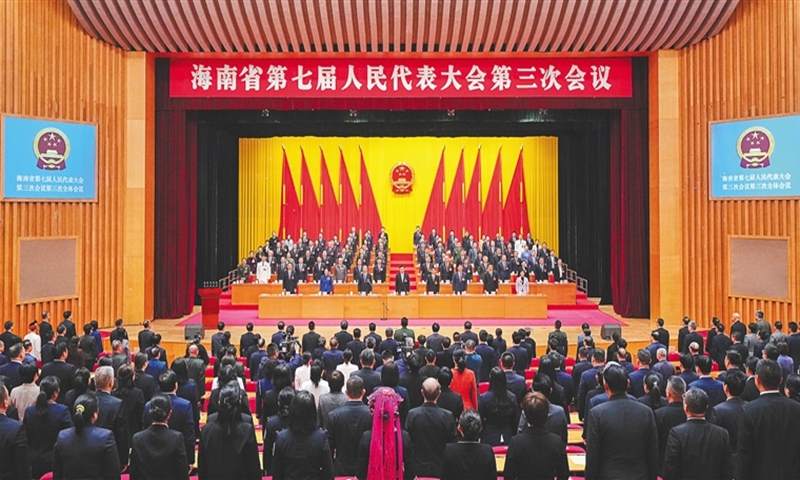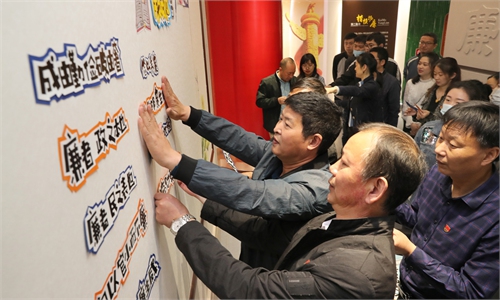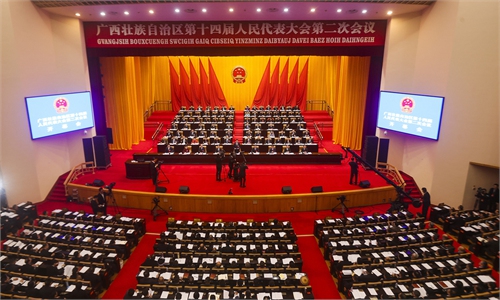Hainan becomes first province to empower legislators to vote on livelihood projects

The third session of the seventh Hainan Provincial People's Congress closes in Haikou, capital city of South China's Hainan Province on January 27, 2024. Photo: Xinhua
The deputies of the provincial People's Congress of South China's Hainan Province on Saturday voted on government projects concerning people's well-being, a first for a provincial legislature. The vote is an embodiment of the country's efforts in promoting whole-process people's democracy, observers noted.
The 365 deputies to the Hainan Provincial People's Congress voted on 12 candidate projects, selecting 10 to be implemented with government funding in 2024, the Xinhua News Agency reported on Saturday. The chosen projects include free vaccination against hepatitis B and a drive to make infant care more accessible.
The vote was held after the provincial people's congress approved a decision in August 2023 to set rules on such voting and to demand people's congresses at all levels in the province follow suit by the end of 2025.
The 12 candidate projects come from suggestions and proposals raised by legislators, local authorities and the public, according to Bateer, vice governor of the province, Xinhua reported.
"The implementation of this voting system is an important measure to practice whole-process people's democracy," said a representative of the Hainan Provincial People's Congress Standing Committee, as quoted by Hainan Daily on Sunday.
Yang Xuedong, a professor of political science at Tsinghua University, told the Global Times on Sunday that the provincial government used to be the final decision maker on livelihood projects.
"Allowing important livelihood issues to be decided by the provincial People's Congress enables the People's Congress to better fulfill its role as the country's legislative body and also better reflects public opinion," Yang said.
He also pointed out that allowing the provincial People's Congress, which represents the people, to decide which livelihood projects should be prioritized can make fiscal allocation more reasonable.
In the new role played by the provincial People's Congress, making decisions is not the only step.
"Voting approval is not the end, but the beginning," said Huang Liju, a deputy of the Hainan Provincial People's Congress, noting that the provincial People's Congress will strengthen supervision of the implementation of projects related to people's livelihood, regularly track the progress of project implementation, and promote the implementation of projects related to people's livelihood, Hainan Daily reported.
This change will place higher demands on the People's Congress, said Yang, as the responsibility of the People's Congress will no longer be limited to voting on legislations, but will also involve continuous supervision and promotion of problem-solving, which will greatly test the governance of the People's Congress.
"China's law empowers the People's Congress at all levels to have decision-making power on major issues," Yang told the Global Times. "By empowering the People's Congress to vote on livelihood issues, the power of China's legislative body will be further refined and better carried out."
As this decision-making process is extended to more provinces, it will also impose higher requirements on the People's Congress in each province, analysts pointed out.
Voting on quality-of-life projects by local legislators was started in 2008 in two townships in the city of Ningbo, East China's Zhejiang Province, according to Xinhua. The practice has previously been implemented at the city and lower-level people's congresses in Chinese provinces including Anhui, Gansu and Shaanxi, but has not been implemented on the provincial level until Hainan on Saturday.



